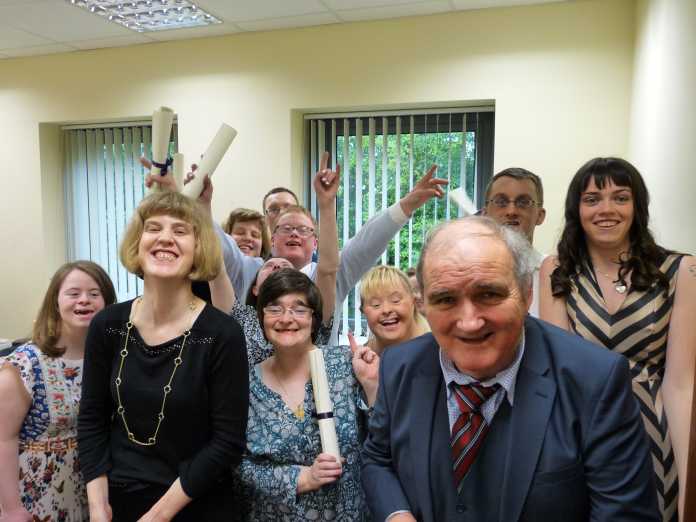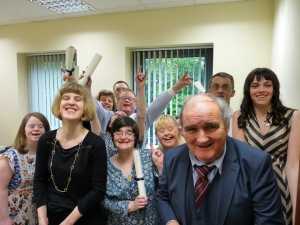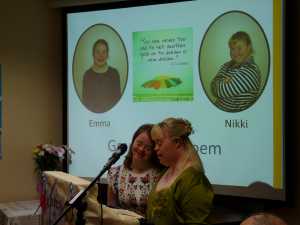
For the past five years, Down Syndrome Limerick have been running a ‘Latch on’ programme for students with disabilities. The two-year course has already made a big difference to more than 60 families in the Limerick area. Daragh Frawley reports.
THE benefits from the ‘Latch On’ programme have been immeasurable.
That’s the considered view of Down Syndrome Services Limerick Director Morgan McMahon whose own daughter Emma recently graduated from the programme.
As he shows me the graduation pamphlet with individual messages from each of the 12 graduates, I get the sense of a man who is immensely proud of all those who helped provide such a sturdy platform for them to flourish.
The students have successfully completed a two year ‘Latch On’ programme under the auspices of the University of Queensland which aims to support the literacy and technological functioning of adults with Down Syndrome.
But, in practical terms, it goes much further.
“The two-year course was provided under a license agreement between the University of Queensland and Down Syndrome Ireland and it involves the measurement of attainments through the course and the monitoring of progress as compared with peers in other ‘Latch On’ centres in Europe and Australia”, explained Mr McMahon.
All teachers and tutors receive specialist training before the course begins and all pupils are assessed at the beginning, mid point and end of term.
Explaining the intricate details of what the course entails Mr Morgan is keen to stress that parents of children with Down Syndrome should have no reservations about the environment their son or daughter would be involved in with the “Latch On’ programme.
“The students are in class from 9.30am to 3pm on Wednesday and Thursday each week in our 5,000 sq ft Castletroy centre.
“All the things that the state fails to provide, we look after”, he explains.
“We cater for 60 families and we employ a qualified teacher and tutors. It roughly costs €25,000 to run the programme, but we cover half the costs per student per annum”
In terms of funding, Down Syndrome Limerick received significant sponsorship from the JP McManus Benevolent fund and also received an allocation from the Government’s dormant accounts scheme .
“Before we secured the funding, a family of one of the students gave us €5,000 as a kick-start. So far, we have managed to stand on our own feet, but this year we may need to draw on reserves”.
Citing his own daughter Emma as an example, he explains how beneficial the ‘Latch On’ programme can be.
“From a start, it was a mixed ability group. Emma, who is 21, was able to read and write in primary school, but her speech and social skills were a little awkward.
“We would understand her at home, but there would be some anticipation with speech and many of her words would be small. Emma was educated in Catherine McAuley’s and had an excellent classroom assistant during her time in the primary school.
When she finished at primary level, there was an assessment and from that followed a placement. In Emma’s case, she went to a smaller placement in the HSE in Dooradoyle which she attends five days a week for four years.
“The HSE placement certainly compliments the ‘Latch On’ programme and the difference in two years has been immeasurable”.
During the course, Emma and her peers have realised that society consists of more than just her family.
“Before the course she would never have initiated a conversation, or would have reluctantly answered questions if asked”, explained Morgan.
“Speaking to the teacher one of the most noticeable progressive factors has been the level of social interaction.
“At the beginning, there was little or no chatting amongst the group but in the space of 24 months there has been a complete turnaround- you can barely keep them quiet!
“As a parent, you notice where you started. Emma is a very well functioning member of her family, but now she is also fully aware of society around her.
“Step by step, technology and literacy have combined to expand their world socially”, Mr Mc Mahon explained.
Referencing his own family’s experience, he also spoke in broader terms in relation to the needs of the Down Syndrome community.
“The theoretical services run out at roughly age 20-21. Parents are getting older and start thinking ‘what is going to happen my child when I’m gone?
“You can imagine a parent’s biggest fear, that their child ends up institutionalised or stuck and not in control, so this programme aims to open their world and give them greater potential down the line”.
And it not just the McMahon family who have found the ‘Latch On’ programme to be highly beneficial.
Other parents and guardians of pupils have sent in letters and told Down Syndrome Limerick how much they have benefitted from it.
A new two-year course is planned fornext September and Down Syndrome Limerick is now inviting applications.
“People of any age can apply and they don’t have to be able to read or write. There is an assessment but if there is anyway we can help, we absolutely get involved”.
For more information visit www.downsyndrome.ie.
by Daragh Frawley













